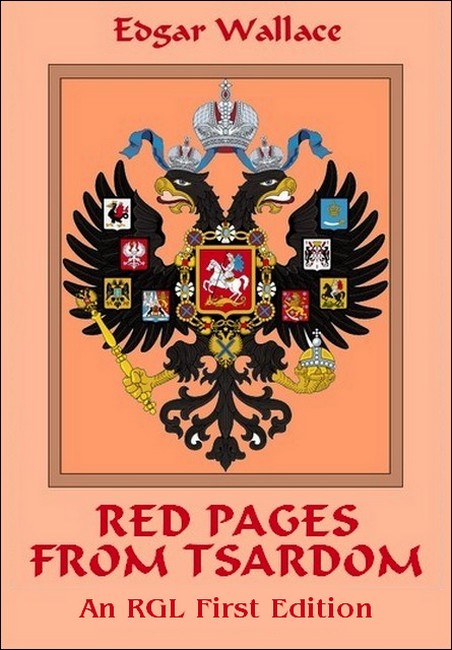
RGL cover based on the Russian Imperial coat-of-arms©
Roy Glashan's Library
Non sibi sed omnibus
Go to Home Page
This work is out of copyright in countries with a copyright
period of 70 years or less, after the year of the author's death.
If it is under copyright in your country of residence,
do not download or redistribute this file.
Original content added by RGL (e.g., introductions, notes,
RGL covers) is proprietary and protected by copyright.

RGL cover based on the Russian Imperial coat-of-arms©
The articles in this collection were originally published in the Daily Mail. The texts given here were reproduced from the New Zealand Evening Post. The scanned versions can be viewed at the "Papers Past" website, which is maintained by the National Library of New Zealand. The spelling of Russian surnames has been modified to conform with present-day transliteration conventions. —Roy Glashan, 9 May 2020.
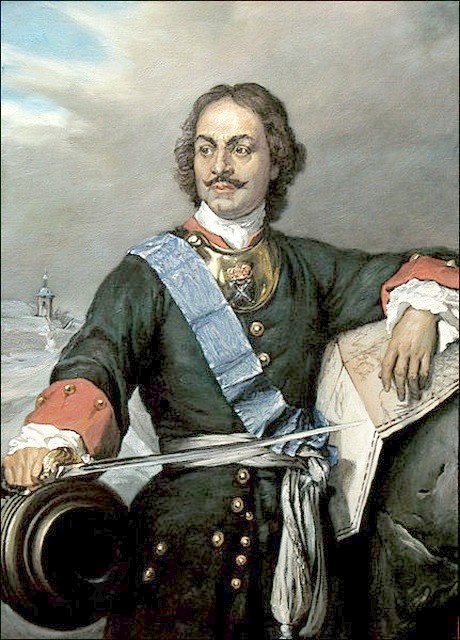
Peter the Great (1672-1725)
Portrait by Hippolyte Delaroche (1797-1856)
Peter ruled with a good thick rod
And well—upon the whole,
As he planted the fear of Almighty God
In the brutish Boyars' soul.
—A verse by Edgar Wallace published in Town Topics during the First World War
THE University of Oxford conferred upon Peter I. the degree of D.C.L. A Russia that had not felt the red-hot irons, nor faced the glow of his devilishly-equipped torture- chamber, christened him "The Great," and minor historians have taught the youth of the world that Peter the Great was am amiable and lofty-browed monarch who loved his people so much that he came to Deptford to learn shipbuilding.
Tsardom proper commenced with Ivan, the Terrible, who was a contemporary of Elizabeth, but Russia dates from Peter, for Peter produced Russia, and from very unpromising material. He drew Russia out of itself—with red-hot pincers. He burnt and hacked and stamped Russia into shape, he seared it with fire, he roused it with the knout, he tortured, lamed, and gouged Russia from the barbarism of Oriental existence to the barbarism of Western make-belief.
Peter the Great was a great butcher, an obscene, vicious neuromaniac, a lustful, bludgeoning, coarse brute of a man who got drunk on raw spirits, had respect neither for age, youth, sex, nor kindred. He flogged his wife, tortured with the most horrible torture his one legitimate son, and then burnt and knouted him to death. Only one woman ever knew and appreciated him, and she was a private soldier's woman who rose by the aid of a field-marshal (who was by trade a pastry-cook) to the throne where at Peter's death she reigned alone an Empress.
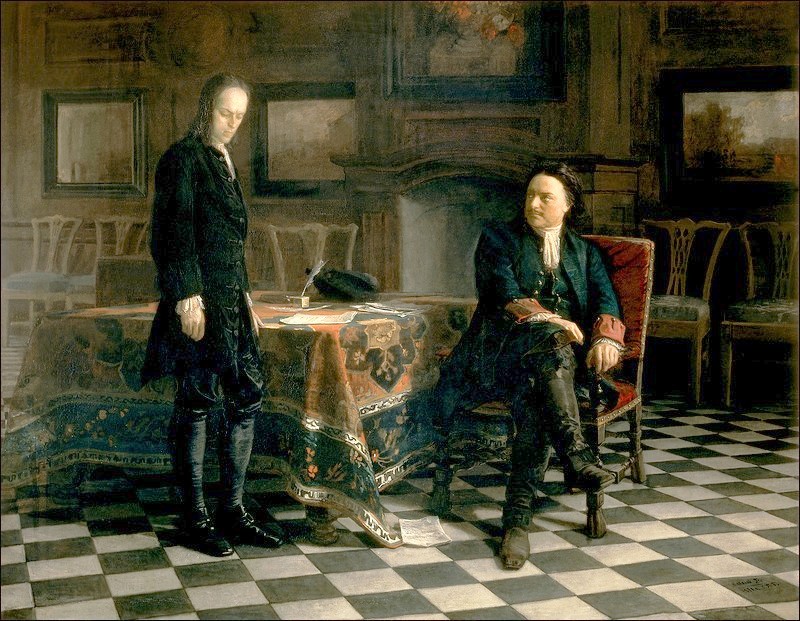
Peter Interrogating his Son Alexis
A
Picture by Nikolai Ge (1831-1894)
Peter made Russia what it is to-day. From its alphabet to its cigarette habit—Peter created it. He established autocracy and made revolution impossible. For Peter was the first of the Russian Anarchists with an infallible creed which he applied to every situation. "Whatever is, is wrong; whatever is not, is right." He was great by accident, for the deeds that earned him the appellation were the least mad of his whims. Curiosity induced him to send Bering to discover the Bering Straits. Russia had no navy: Peter evolved one; no army: Peter created one, If Russia had had no peasantry he would have formed one—but serfdom existed; so Peter, working from the other direction, placed a serf upon his throne and a pastry-cook it his right hand. Peter was a great meddler, a man with in insatiable desire to alter the existing order of things. Sometimes his meddling resulted in good, but mostly in hideous evil.
In these articles I want to trace Russian history from the moment Peter began making it. All that had gone before does not count, except that Peter had a mother who was the wife of the Tsar, and that Peter may have descended legitimately from the line of Russian rulers; historians are discreetly vague as to this.
The story of the Tsars from Peter to Nicholas is the most wonderful story in the world's history; you shall see how lunatics and wantons, imbeciles and horrible villains, governed Russia and held the destinies of its millions in their soiled hands.
Peter was the first; Catherine—licentious, drunken, brutal—was the second; then a thin ghost of a man, who died of smallpox; then Anna, who slew ruthlessly, then Elizabeth, that loose-living woman; then the imbecile Peter and Catherine the Great, a woman who had a hundred lovers; and Paul and Alexander and Nicholas; and so the present Tsar. There is no story that has ever been imagined so wonderful as this. One may tell it, knowing that there is no necessity to point a moral, for the story of the Tsars, plainly told without embellishment, is the story of the present revolution.
Peter was the son of Alexis's wife. It is presumed that he was Alexis's son. It is not very certain that this was so, but in view of the laxness of relationships of the time it is not held to be of account. Subsequently there were unblushing happenings at the Court which placed the legitimacy of Peter beyond the worth of controversy.
When Alexis died he left issue by two wives, and about each wife gathered a faction eager for spoils, willing to speculate their lives in the hope of finding themselves on the winning side.
The death of Feodor, the eldest son, much bloodshed, many midnight assassinations, fierce, open fights, and wholesale butchery placed Russia under the triangular sway of Peter, Ivan his brother, and Sophia his sister. On the throne sat two men: Peter, a quick, observing man, with narrow eyes, peeking his head from side to side, watchful, restless, purposeful; by him, Ivan, half- witted, half-blind, loose-lipped, debauched—a glassy- eyed dolt, with inclinations towards drunkenness and general bestiality. Behind them, Regent, jealous of her power, suspicious, half inclined to preen herself on the magnificence of her uncertain state, half horrified by the terrible responsibility of her position—Sophia, the sister. Here were the three who ruled Russia—and what a Russia!
An Oriental country peopled by soulless things that came and went at the bidding of their owners; who obeyed, unquestioning, the command of the men who bought them on the market place and sold them as so many cattle. An aristocracy that was Eastern—Eastern in thought, dress, and custom. Men with Oriental beards and the flowing robes of the Orient. Men who did not smoke, who kept their women veiled, who were more Eastern than the Turks and certainly less enlightened.
All this Peter saw, fidgeting on his throne, taking stock of the country, between mad moments of unbridled license, watching his sot of a brother and already condemning, contemptuous of this fine "Regent" of a sister.
It did not take him long to decide, if indeed there was ever a moment in his life when he had not already made up his mind on the subject. He slipped from his throne and went to work swiftly, unerringly, and with a workmanlike thoroughness: Ivan was dethroned; Sophia was sent to a convent. All that was easy; Peter had never any doubt as to the result.
From the day of his accession he knew that, being the master mind, he was virtually Tsar, and the deposing of these self- satisfied relations of his was but an incident unworthy of any doubt as to the issue.
Peter sat alone in his glory at Moscow. Russia was disorganised, partly by reason of its vast distances, partly because chaos was its natural condition, from which it had never been reclaimed. Russia, too, was asleep. Profoundly, heavily asleep with the placid contentment of people steeped in fatalism.
Peter awoke Russia. For this he gained the surname of "Great." Not with any gentle pressure of the hand, with any soft word of remonstrance, not with song or crash of music.
He woke Russia with the jab of a surgeon's knife—an amateur surgeon. The experience was a novel one for Peter. The anguish of the awakening sharpened his appetite for novelty, and he thrust and thrust again.
If there was a method in his madness, it was of a negative quality. If he started out to reform this Empire of his, with any system, it was based upon the reversal of established order.
Ukase and edict and proclamation reformed Russia. Men who were bearded were ordered to shave clean, Smoking, which was prohibited under dreadful penalties, was ukased into custom. With one flourish of his pen he re-dressed Russia. He dragged the women from the sanctity of the purdah and made them dance in public.
"If you cannot dance, madame, I myself will teach you. Thus must you place your foot—and thus—and so."
And Peter, sweating with the energy of his exertions, thrusting a highly born woman of the Court into one place, thrashing another—he carried a stick, the better to point the lessons—made Russia dance, ladling to the startled ladies brandy with a wooden spoon, until he and his Court, noble and dame alike, lay drunk on the floor the dancing-room.
This was Peter. Thorough in everything—a mad brute of a man, ignorant, superstitious, beastly, but thorough. The slave of his whims, the creature of every passing fancy, shameless—but thorough.
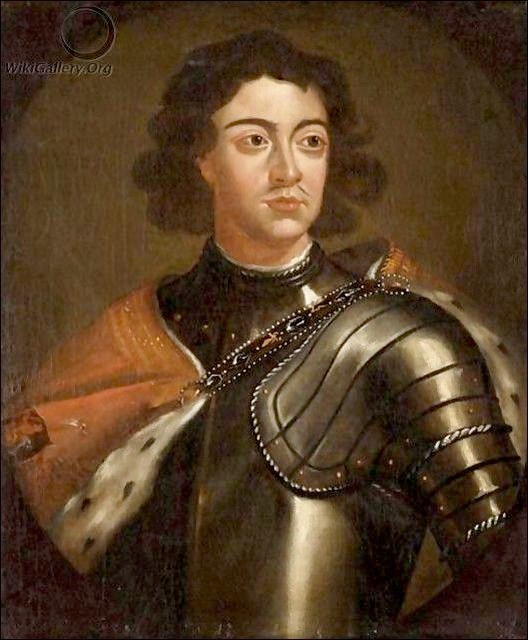
Peter the Great (1672-1725)
Portrait by
Sir Godfrey Kneller (*1646 in Lübeck, +1723 in London)
KNELLER* painted a portrait of Peter the First; you may see it at Hampton Court. A stubborn-jawed, self-willed boy he looks, "tall, with a head that shakes, a right arm that is never quiet, and a wart on his face" is the description given to him, but there are others which help you better to understand this Peter.
His early training had not helped to refine him; he had uncleanly habits, coarse manners, degrading vices, and about him hung the musty smell of the wine- shop. There is an eloquent letter written by Sophia Charlotte of Hanover, who, curious to see him, wrote to her Minister: "I would have him persuaded to come here, not to see but to be seen, and we would willingly keep the money generally spoilt on rare animals for use on this occasion; though I am a great enemy of dirt, my curiosity is too much for me."
I have said in the previous article that historians are vague as to the mystery of Peter's birth; he was as unlike his father Alexis as could well be imagined. Alexis was puny and worn out by illness; Peter was tall, brutally strong, broad, with muscles of iron. His parentage troubled him very little, but once upon a time Peter, half drunk, anxious for a quarrel, turned snarling upon Tikhon Streshnev, his mother's favourite: "That fellow," he cried, pointing to one of the company, Ivan Mussin-Pushkin, "knows, at all events, that he is my father's son! Whose son am I—yours Tikhon? Obey me, speak and fear nothing; speak, or I will have you strangled." White of face, the favourite fell on his knees. "Mercy," he gasped. "I know not what to say... I was not the only one."
The mock mission which went abroad to request the Kings of Europe to "renew the ancient bonds of friendship" included one Peter Mikhaylov—a non-commissioned officer. Letters intended for Mikhaylov were inscribed "to be given to Peter Mikhaylov," and the seal of this simple soldier represented a young carpenter surrounded by shipwrights' tools, and the motto, "My rank is that of a scholar, and I need masters."
In this wise Peter went forth to gather the wisdom that Europe could impart to him, and he did well. He made love to servant- girls in Holland, he got drunk with Dutch captains, he behaved like the ill-bred boor that he was. He worked with his hands at carpenters' and ship-builders' shops, it is true, but small praise for that, for he was more in his element there than at the Court. In his youth, an astrolabe was a fascinating thing—in Europe a toy that showed the direction of the wind claimed his attention. Most of all, in Sweden, the wheel on which malefactors were broken pleased him. He ordered one for Russia.
In England he lived at Buckingham-street, but later removed to Deptford. Again he worked with his hands—and with such effect that when he vacated Sayes Court, Evelyn, its owner, claimed and obtained a large sum of money from the British Government as compensation for the shocking damage done to his property by that half-mad lout.
Historians have produced Peter's incognito as evidence of his great modesty, but Peter was as much lacking in modesty as he was in shame. The humble role he filled fitted him. He was at home with lackeys and stablemen all his life, and was never so ill at ease as when, in a German Court, he was handed a table napkin.
One quality stands out in his character—his tremendous energy. Add to this a curiosity that led him, from workshops to Court, from post mortem chamber to laboratory, that made him in turn ship-builder, firework-maker, ivory-turner, surgeon, priest, soldier, sailor, executioner, and big drummer.
He plumed himself, too, on his dentistry, and you pleased him best by asking him to pull your teeth. He was informed of all the interesting surgical cases at Petersburg Hospital, and sometimes assisted at operations. Once he operated on a woman. She fought terribly against this amateur, but Peter went on with the operation, and the woman died. Peter went to her funeral. His valet de ohambre complained of his wife's conduct to him. Peter learnt that the wife's excuse was a bad tooth! The Tsar sent for the woman, pulled two teeth, she protesting with screams and tears.
"If you do hot behave well to your husband, I will pull out every tooth in your head," said the young savage calmly.
He learnt something in England; he learnt more in Austria, for the news came that Sophia was plotting with his brother against him. Sophia was an unattractive woman. Her best friends enlarged on her qualities of mind and were discreetly silent concerning her personal appearance; but none the less she had a lover, to whom she wrote in the extravagant language of her time. More, she had supporters at Moscow, so Peter hurried back, and very soon hot irons, the knout, and the axe repressed rebellion.
Hundreds of heads decorated high-placed spikes, conspirators hung in bunches, and dead bodies by cartloads were flung outside the city to rot.
Ivan—what became of Ivan? He died (some say of poison, some say of the knout— that he languished in prison and died of prison fever, At any rate, he disappeared; so did Sophia, except that her destination is known to have been a convent.
Waliszewski, with a desire to be fair to Peter, idealises him. This historian is the greatest apologist Peter has had, for there is an element of justice in all his deductions.
"He was a man with one idea a day," says the enthusiast. It was an idea, that all the wastrels and drunkards and lunatics in the country should he gathered into "a council that knows no sadness." It was an idea that he should sanction and help to carry into effect a blasphemous travesty of religion with mock priests and mock ceremonies.
Here is an idea of Peter's which shows better than anything else the grotesque kink in his brain. Detecting in a conspiracy against him a resemblance to a previous plot many years old, he had the body of the man who had been executed for the previous crime exhumed, and dragged on a sledge drawn by twelve dogs to the place where the perpetrators in the later plot were about to expiate the crime with their lives.
Underneath the scaffold was drawn the sledge with Its gruesome burden, in such a position that when the condemned men were cut to pieces with knives—the slowest form of death Peter could devise-their blood dropped upon the man who had previously conspired.
There is a book published for private circulation only, a copy of which id unprocurable in England, which give some details of Peter's amusements.
There is a story that Voltaire sickened of this volume before he was half way through it. "He is half a hero," was Voltaire's paradoxical comment, but he was half a devil too.
He had found time to many when he was young—he lived with his wife for a few months and then left her. His one son, Alexis, he depraved by example, and when this boy fled to Austria and then to Italy, on the discovery of his complicity in a plot in which his mother was concerned, Peter secured his betrayal into Russian hands again.
Alexis was put on trial, his mother was knouted and banished, some of the conspirators were impaled or broken on the wheel, and others were beheaded or mutilated.
The trial of Alexis was a farce, his torturing to extract the names of his confederates—which he cheerfully gave—was horrible, remembering that Peter himself superintended the ceremony. His subsequent death under torture Peter seized as an occasion for merry-making.
"He launched a new ship and cracked jokes with the Ministers," says the historian, and later ordered a medal to be struck with the inscription, "The Dawn Is Clear."
Even Catherine could not save the young Tsarevich from torture, and the influence of this extraordinary woman on Peter was greater than that of any other person in the world,
About this Catherine whole story might be written.
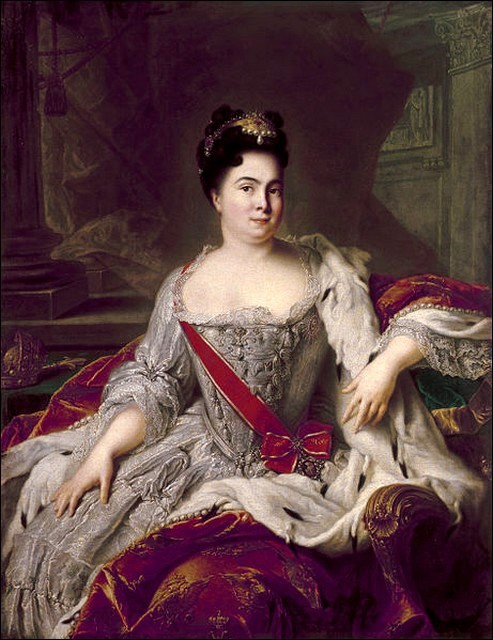
Tsarina Catherine I (1684-1727)
Portrait by Jean-Marc Nattier (1685-1766)
WHEN Peter wanted a thing he got it. He had no false delicacy—he asked for what he wanted; if it was given, well and good; if it was refused, he look it. A traveller of this period was shocked to see the Russian nobility pocketing silver from his table; a King of one of the civilised countries who entertained Peter was aghast to observe that monarch—who was his guest—take possession of a priceless amber cabinet belonging to his host.
Once, while on a visit to Berlin, Peter had a great fancy for a mummy in the museum, and asked for it. The curator respectfully but firmly declined to hand over the finest specimen in Prussia. Whereupon Peter seized the mummy in his strong hands, rent it in pieces, pulled off its nose, and strode away.
"Now you can keep your mummy," he flung back over his shoulder to the horrified official.
All the things that Peter wanted were not good for him, but that was incidental. He had a trick of demanding foolish toys without possessing house- room for them. He built his navy before he had a sea to put it in. He made war before he had an army.
Once it occurred to him that he had never experienced the sensation of being governed; that he had always been the first man in Russia, and, if not the first always a possible first whom people might diplomatically obey. But governed he had never been, either by others or by himself. It would be a new sensation; so he created a mock Court, with a mock Tsar, a mock Metropolitan, and mock courtiers. It was his whim to be regarded as a plain captain, and pay reverence to the Tsar he had set up. It is recorded that Peter applied to this mock Tsar for promotion to the rank of admiral, and his request was refused, which pleased him.
He wanted companionship. Therefore he took the most lovely women of his kingdom one by one, and one by one, as these dissatisfied him, he dropped them. It was the custom in those days when the Tsar chose a wife for officials of the Court to invite applications from the women of the kingdom, Thousands applied, and were submitted to the most strict and intimate test. The flower of these were taken to the palace, and there, in one long narrow room, they were detained. At night when they slept the Tsar walked between the narrow gangway that separated the beds, and from the sleepers chose his bride.
Peter had already taken a wife and discarded her. He adopted even less refined method for choosing her illicit successors. They came—a long procession of them—they stayed their little while, and went away. None pleased him. Had he the soul of Catherine the Second he would have pensioned them off handsomely, but to add to other vices, he was mean and niggardly, A pilot who had saved his life in a storm on the White Sea he rewarded with £3.
One of these passing fancies of his was Mary Hamilton—a Russian of Scots descent and a maid of honour. Mary Hamilton slew her children that her shame might not be known—that was bad. Also, she robbed the Tsar—that was unpardonable.
Mary Hamilton mounted the scaffold "in a white silk gown trimmed with black ribbons." This was an idea of Peter's. The theatrical side of the display interested him, and he was present at the execution, embracing the condemned lady at the foot of the scaffold and exhorting her to pray. So he supported her on to the scaffold and signalled to the executioner... Then the Tsar lifted the severed head and calmly began a lecture on Anatomy, drawing the spectators' attention to the names and functions of the various bones and muscles that had been cut through by the axe.
Other women escaped from this ogre with less hurt to their necks than to their pride, Peter, notwithstanding the fact that he rescued womankind in Russia from the stifling harem, brought her into public, and gave her certain rights, had neither respect nor pity for her. He dragged her unveiled into the light because he could not tolerate the existence of a sanctuary to which he could not penetrate. His treatment of women was always that of an uncouth boor; he would force young girls to swallow a trooper's portion of brandy; he could ruthlessly mutilate and torture women whose only faults were that they had shown disgust at his brutality; and he could knout his wife and thrash her maids of honour. And yet he needed companionship and eventually found it.
Catherine was the woman, and if the cold heart of Peter "the Great" was ever touched, it was by this wonderful peasant Catherine's mother was a serf: her mother's husband was a serf also; her father was a high-born Livonian. Her mother and her nominal father died, the high-born Livonian disowned her, and Catherine was brought up in the household of a schoolmaster pastor. An economical soul was this Catherine; perhaps it was this quality that attracted Peter. Her schoolmaster's pupils complained that she stinted their bread and butter. She grew to vigorous girlhood, and had a little girl, which died in a few months. Then the schoolmaster thought it best that she should marry, so betrothed her to a Swedish Lifeguardsman, who disappeared soon after the marriage. When Catherine was Empress she sought out her first husband and pensioned him.
The campaign in Livonia brought Catherine into camp as the friend of a non-commissioned officer, who beat her. Her ascending star brought her to the general's tent—and he thought her wearisome. No she passed by successive stages to the marshal, who had been a pastry-cook—Menshikov was his name—and he was the favourite of the Tsar. In a menial capacity as a scrubber of floors and a polisher of chairs, Catherine served the marshal. Later he made love to her. Then came Peter on a visit to his favourite, and saw Catherine. He did not fall in love with her, because that was not Peter's way; but he gave her casual attentions, and she divided her favours between Tsar and master. Then Peter bargained for her and took her.
Catherine began by being useful, became a habit, and ended by becoming indispensable. It is probable that from the very first she fascinated the Tsar to some extent; certainly she pleased him, for after his first tender passage with her he gave her two shillings! Certain it was that her influence was of gradual growth. Peter had other lady friends besides Catherine, and with this arrangement he was perfectly complaisant.
It is said that all this time Catherine was the secret wife of Menshikov; but, as she had never been divorced from her first husband, the Lifeguardsman, the truth of this story is hardly worth enquiring into. How far she increased in Peter's favour may be gathered from the fact that on his departure from Moscow to take part in a campaign he left instructions that, should he die, she should receive £300.
Catherine's name has been execrated as one who was degraded and brutal. She has been variously described. One said that she possessed great beauty, that she was tall and strong, that she was pleasant in manner, kindly and gentle, showing deference and respect to those whose opinion carried weight, and that she behaved herself in the presence of contemporary Sovereigns with extraordinary dignity. This was a man's description. Here is another: "She was short and huddled-up, devoid of dignity or grace; the very sight of her proved her low origin; she was muffled up in her clothes like a German comedy actress; she wore a dozen orders and as many portraits of saints and relics fastened all along the facings of her dress, so that when she walked she jingled like a mule." This, of course, is a woman's description.
Whatever she was, she was much better than Peter, Whatever her origin may have been—and there is less mystery about it than Peter's own—she was infinitely too good for him. She was temperate, and certainly for many years of her life faithful; she did much to check his excesses, and her foresight and keen judgment helped him towards the successful termination of the campaigns he from time to time undertook. Later, with a knowledge of Peter's character, she prepared for a possible downfall, and accepted bribes and connived at corruption, which Peter discovered; he forgave her this, for by now she had been crowned Empress. Later she look a lover, and that Peter found hard to forgive; the lover was decapitated, and his head, in a pickle jar, was placed by Peter's orders in Catherine's apartment, that she might see it every day, and, seeing, remember.
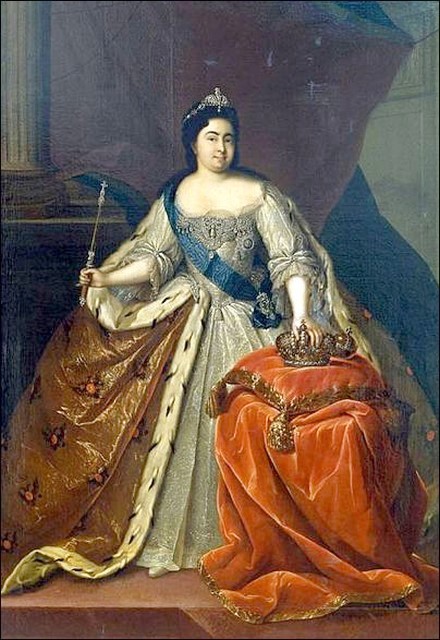
Tsarina Catherine I (1707-1727)
Portrait
by Heinrich Buchholtz
PETER differed from Satan in this respect—Peter was not immortal. So that when in the fullness of time Death stretched forth an icy hand and claimed the monarch, his contemporaries breathed a sigh of relief and expressed their thankfulness.
Peter's end came six years after the murder of his son; he was then fifty-two. What disease he died from nobody exactly knows; the symptoms are set forth with engaging frankness In Richter's History Of Medicine In Russia.
The strong man lay dying, and Russia rejoiced. It was left to a later generation to idealise him. His subjects were too near the barbarities to appreciate the breadth of his mind and the wonderful motives with which he has since been credited. He received the sacrament, and expressed his penitence, and died with Catherine weeping floods of tears on his pillow, and a coup d'état already arranged for placing her on the throne.
There are stories of the death-bed scene which are admittedly apocryphal—how his last moments were made terrible by the grisly wraiths of men and women whom he had tortured; how accusing hands came out of the gloom and horrid faces gibed and mouthed at him. Poetic justice demanded such an end, and obliging historians have supplied the need.
Peter did many things for Russia, for Russia to him was—Peter. He set forth to reform Russia, and he did it: he reformed it literally. He had a thousand vices and no virtues; that is, unless you can claim energy and curiosity as virtues. He outraged convention—that may be his epitaph.
Frederick the Great of Prussia wrote a better in a memorable sentence. Writing to Voltaire, he said: "Lucky circumstances, favourable events, and foreign ignorance have turned the Tsar into a phantom hero. A wise historian who witnessed part of his life mercilessly lifts the veil and shows us this prince as possessing all the faults of man and a few of his virtues. He is no longer that being of universal mind who knows everything and desires to sift all things; he is a man governed by whims sufficiently novel to give them a certain glamour and dazzle the onlooker. He is no longer that intrepid warrior who neither feared danger nor recognised it but a mean-spirited and timid prince, whose very brutality forsook him in seasons of peril—cruel in peace, feeble in war."
After Peter came Catherine. Her reign was short, hilarious, inglorious, Yet, with all her faults and frailties this peasant's daughter was in Peter's lifetime a temperate, honest woman, and deserves tolerably well at the hands of posterity. When Peter died she threw aside restraint, and drank herself to death in eighteen months. Then she passed, and with her—though not from life—Menshikov, the pastry-cook. He, little tyrant and great thief, rich from the peculations of years of favour, a stealer of lands and usurper of vain titles, was to end his life miserably in exile on a few kopeks a day.
Following Catherine came the son of the murdered Alexis and grandson of Peter—Peter II.
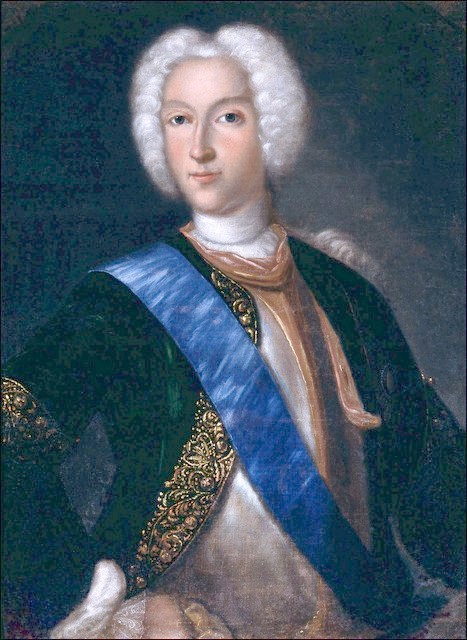
Tsar Peter II (1715-1730)
Portrait by Johann Heinrich Wedekind (1674-1736)
Alexis, convicted of conspiracy, had been knouted to death; his mother, Peter's first wife, Eudoxia, had been consigned to the cold miseries of convent cell, and had grown old in suffering. One day warders came and unlocked the cell, and the trembling Empress was led forth to a sumptuous apartment, to costly gowns, dazzling jewels, and bowing courtiers. Peter the Second had ascended the throne; his grandmother was free. For three years this Peter reigned, then smallpox took him off before he had had time to establish his identity on the pages of history.
Then came Anna, niece of the great Peter, a childless widow with a predilection for lovers of low origin, one of whom, Biron, used his opportunities so well that he ruled Peter's Russia for ten years with profit to himself. One would like to know more about this Biron, for he was a man around whom many stories might well centre. For ten years he was an uncrowned Tsar, and among other achievements he slew twenty thousand people and banished as many to Siberia. Such stories as are told of him are unprintable, but it may be suffcient to know that he was a beast. He was to have an unhappy experience, for when Anna, died she nominated her nephew Ivan, son of a fat, foolish, round-faced German princess and her no less fat, foolish, and blue-eyed husband.
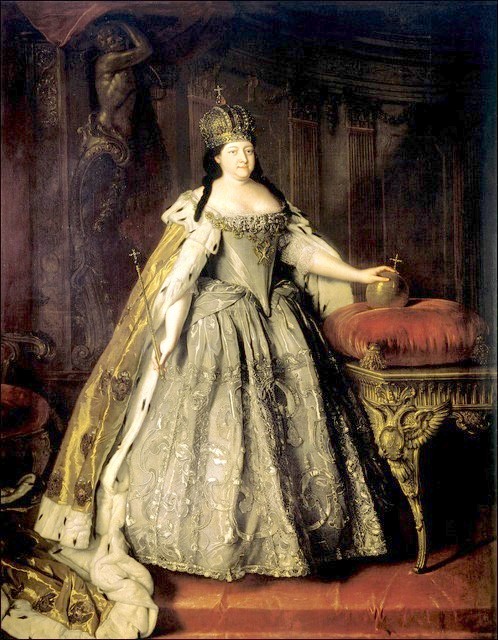
Tsarina Ann (1693-1740)
Portrait by Louis Caravaque (1684-1752)
Ivan, the infant, was proclaimed Tsar, Biron was appointed Regent. Foolish Biron! Satisfied with his power, he bullied and spoiled and kicked Russia till one morning they took him out of his bed, hurried him off in his nightshirt, his teeth chattering, his feet numb with the cold, to the Fortress of Peter and Paul. Thence to Siberia was a step. For the stout princess with the vacuous face had bribed and promised and persuaded the aristocracy—such as it was—to overthrow the Regent.
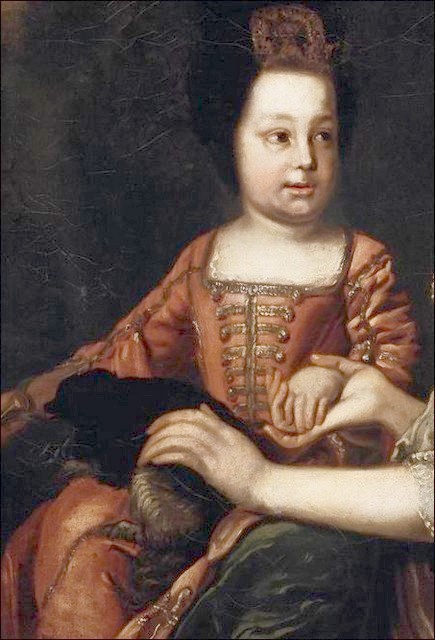
Tsar Ivan VI (1740-1764)
Portrait by an unknown artist
The sway of the fat princess was short. It may be she was elated by the success of her coup—it may be that that easy success frightened her, for arrogance and suspicion characterised her treatment of the men who established her regency. Suspicion creates reason for suspicion, and soon there were whisperings at Court, meetings in queer little houses, mysterious watchwords, and all the signs of great happenings to come.
For among the children born to Peter and the dissolute Catherine was a chit who had grown into a queenly girl, "tall, stately, and graceful, her head magnificently posed on splendid shoulders, her hair brown and silky, her eyes deep blue and slumbrous... the whole countenance indicating one devoted to pleasure."This is Mr. Molloy's description of the lady, which is not exactly supported by a contemporary engraving which shows a woman hideously broad of face, thin-lipped, fat and sleepy.
It pleased Elizabeth, like the "Virgin Queen" of these isles and of a similar name, to take on the pose of eternal celibacy. Elizabeth of Russia's heart was in the grave of a German Prince, Charles Duke of Holstein-Gottorp. Charles won dead, and Elizabeth vowed to remain single. That she did this is history, but she had lovers unending. About this woman gathered the malcontents of the Court. She was Peter's daughter, and Peter had been long enough dead to be idolised.
The Regent feared this Princess, feared her more than she feared her own dolt of a husband. She flared up like the virago that she was, and accused Elizabeth of desiring the throne of the infant Ivan.
"I will marry you to my brother-in-law, and if you refuse I will send you to a convent," stormed the Regent.
The threat sobered Elizabeth. She loved good living, she loved luxury, she loved idleness. For her part the throne might pass to Ivan. She was content, and there were those who were not. Had it not been for the threat she might have taken no part in the conspiracy.
Somebody sent a cartoon to Elizabeth. On the one side was inscribed a portrait of herself seated on a throne, with crown on head and sceptre in hand. On the other she stood before an artistic background of gibbets and rack, in the habit of a nun. This helped to decide her. Regiments were corrupted, a few officers were assassinated, the fat Regent and her husband were seized and convoyed to a bleak hut in the Arctic regions, where she died a few years later. So Elizabeth became Tsarina.
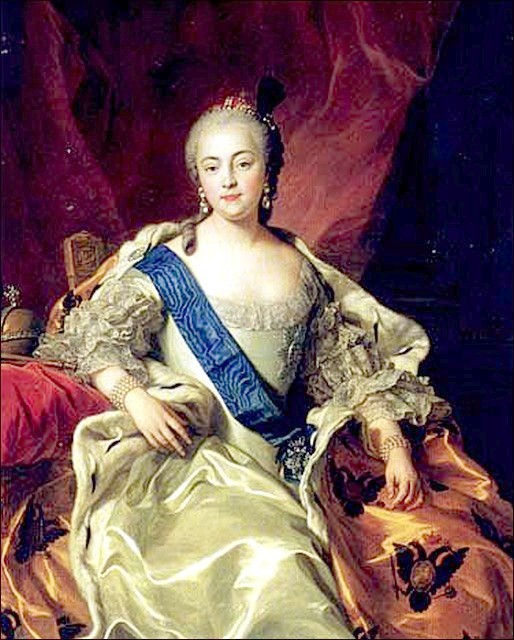
Tsarina Elizabeth (1709-1762)
Portrait by Charles-André van Loo (1705-1765)
YOU may think from the portraits writers have drawn of her that Elizabeth was a beauty. They rhapsodise over her hair and slumbrous eyes, her fine brow and full lips. They sum up her character as "one who loved pleasure." The portraits painted by contemporary artists are scarcely as flattering. They show a broad-faced woman with sleepy eyes and a hard mouth. On one thing artist and writer agree. It is the face of an indolent, luxurious woman.
A vow of Elizabeth's is recorded. She would have nobody killed during her reign. An admirable resolve that somewhat embarrassed public executioners. For these worthy men trod on the thinnest of ice in the performance of their duties.
Their task to wield the knout—without fatal consequence; to tear out tongues—without endangering life; to break human bodies and preserve a flicker of life.
Elizabeth was Peter's daughter.
She had vowed not to kill but the rack, the grille, and the strappado were requisitioned continuously. There is a story of a fair lady, Natalia, who dressed in pink.
Pink was the shade that best suited Elizabeth. In consequence there went forth a ukase that no other lady of the Court should ape the Tsarina. Natalia appeared in pink, and Elizabeth boxed her ears. Worse, she suspected her of treason, and her relatives wore seized, whipped, gouged, and racked that Elizabeth's worst suspicions should find support.
No such confirmation was forthcoming, but this did not prevent the unfortunate Natalia mounting the scaffold—a few weeks before the birth of her child—nor the knouting that followed. Poor beautiful Natalia struggled as the executioner roughly tore her dress from her shoulders. She sank shrieking on the scaffold as the cruel thong fell upon her white skin. Afterwards they pierced her tongue through with a red-hot iron.
Elizabeth was Peter's own daughter, for she loved the theatrical. Ostermann, the fat Regent's Chancellor, had earned her hatred, and there were others, They were tried and sentenced to be broken on the wheel. Here is the scene:
Count Ostermann was led forward between a file of soldiers. An old man, bent and with grey hair falling on his shoulders. In the bleak air of that January morning he stood bareheaded, listening and nodding his head as each fresh accusation was read out—and there were five sheets of such. He was sentenced to be broken on the wheel, and the crowd wondered since there was no wheel visible, In its stead was a large block and a formidable axe, and to this he was led, the executioner, acting under Elizabeth's direct instructions, making the preparation for despatch as slowly as possible.
He fumbled at the buttons of the old man's shirt; he turned down the collar, then turned it up again; arranged and rearranged the tumbled hair.
"Kneel."
The old man knelt and laid his neck on the block, and the executioner played with the axe.
Then, as the aged Chancellor waited, for the blow that was to send him into eternity, an official stepped forward and announced that God and Her Majesty gave him his life.
The whole scene had been designed and arranged by Catherine. Ostermann raised himself painfully, buttoned his shirt, and said to the executioner:
"Give me my wig and hat."
As with Ostermann, so with the rest—the same farce, the same slow, awkward preparation for death, the same reprieve.
Thus Elizabeth earned the title of "the Clement."
Peter the Great had established the right of Tsars to nominate their successors, and it became necessary to nominate her heir. Her heart being in the grave of a dead German prince, she chose his nephew, a Prussian princelet with a taste for strong drink and an aversion from cold water.
To him came notice of the Tsarina's choice, and he hurried to St. Petersburg, a crooked boy with a receding forehead and fishy eyes, shuffling and grinning uncomfortably as the nobles kissed his dirty hand and did him homage.
A curious boy, this Peter. Stable lads were his boon companions, brandy was his favourite drink, and playing with leaden soldiers his best-loved amusement.
He wore a succession of uniforms modelled on those of the German Army, for which he had a passionate admiration, In these uniforms he was wont to review an army of toy soldiers, very seriously and very conscientiously. Frankly, he was half an imbecile.
At a very tender age his taste for strong drink had been remarked upon—he had other tastes which are only hinted at.
For him a bride was chosen. Waliszewski calls her Finchen, which, he thinks, may have been German for Sophia, for she, too, was the daughter of a prince shining dimly in a cheap and obscure German Court.
Her mother took her to St. Petersburg, and her mother, who was a foolish, meddling women, with an inclination for petty intrigue, almost sacrificed her daughter's prospects by being uncomplimentary to Elizabeth. Finchen embraced the Orthodox faith with cheerful alacrity, and took on the name of Catherine. Afterwards her biographer christened her "Catherine the Great," and this unknown princess from Germany was destined to achieve the distinction of being the most remarkable woman in the whole history of Russia.
Russia, did not produce her, but it fostered her. Receptive, impressionable, imitative, Catherine became Russian in thought and act. This little lady from Germany, who played as a child with the towns-children of her native town, who left her good- natured father bearing under her arm a stodgy and ponderous treatise on Lutheranism, and in her ears his pious exhortations to keep to the paths of Protestantism—this same obedient, quiet child promptly entered the Greek Church, promptly disregarded her early training, became Russian in spirit, habit, and dissolute practice.
Only by our own fine code of domestic morality do we pronounce Catherine dissolute; judged by the standard that was applied at the time, she was no worse and no better than her high-placed contemporaries.
She married Peter. Peter spent the honeymoon confiding to her the story of his love affairs, invoking her assistance to secure the success of his pursuits. It may have been that it was at this period Catherine began encouraging the attentions of her admirers.
It was a few years afterwards that Elizabeth became alarmed at the non-arrival of heirs to the throne, and gave a semi-official sanction to the attentions of one lover, Soltykov. Later a child was born, the Grand Duke Paul, and was whisked away by the Empress, who was anxious that the heir should he brought up under her eye. Catherine did not see the child for many months. She did not see Soltykov again for many years, for he was sent on a special mission to the Courts of Europe to announce with solemn pomp the birth of his son.
One hundred thousand rubles was Catherine's reward for him. It is interesting to learn that Peter, in a furious rage at receiving nothing, claimed and received a similar sum.
With the birth of Paul begins the story of Catherine and her lovers. It is a story which throws an illuminating light, not only upon the state of Russian society, but upon the condition of the common people.
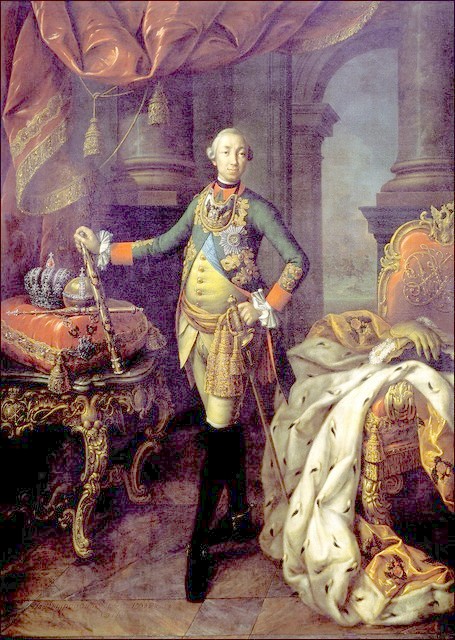
Tsar Peter III (1709-1762)
Portrait by Aleksey Antropov (1716-1795)
PETER and Catherine began their reign peacefully. Russia was at war with the Prussian King; but the foolish Peter, driller of pasteboard soldiers, adapter of German uniforms, devoted and ecstatic admirer of Frederick the Great, brought the war to an immediate and inglorious finish. Peter worked fervently to inculcate into the Russian Army some semblance of German method and appearance.
He wilfully omitted to take into account the hatred every good Russian bore for every German.
Also he displayed alarming Protestant tendencies, and his irreverent behaviour in church was in striking contrast to the ostentatious piety of Catherine.
Also he was offensively rude to the Guards, upon whose loyalty to a great extent depended the security of his throne and person.
Last—greatest of his follies—he behaved badly to Catherine herself.
Imagine the scene. An Imperial banquet, with beer and pipes as evidence of Peter's Prussian sympathies, and the Tsar stumbling to his awkward feet, swaying and holding on to the edge of the table for support.
He had proposed the toast of the Imperial Family and Catherine had not risen. There was really no reason, why she should. Peter turned to an official: "Tell the Empress she is a fool," he said, but before the courtier could reach the Tsarina Peter rose and glared at her across the table.
"Fool!" he roared, and the guests saw tears in Catherine's eyes.
There were hints that Catherine was to be banished to a convent. But the Guards were ripe for action against the little German tyrant, and one day Peter learnt, with genuine astonishment, that his wife had been proclaimed sole Sovereign, and that he was deposed.
Later he was sent to a lonely château, "amid very pleasant surroundings," Catherine assured us, and to him one day came the Orlov brothers, approved lovers of Catherine, great, strong, animal men, with large, remorseless hands.
Karamzin, the historian, tells what followed. Orlov announced to Peter that he was to be released and permitted to retire to Germany and live in tranquillity there.
"I have come to dine with you to celebrate your release, according to our Russian custom," said Orlov.
While Orlov chatted with the Tsar, one of his accomplices, an officer named Teplov, poured out wine and mixed poison in the Tsar's glass. Peter took it without suspicion. Immediately he felt, terrible pains. He knew that an attempt was being made to poison him. He cried out for milk. A faithful French valet came to his help. The conspirators threw the valet out of the room. Then they mixed a stronger glass, and offered it to Peter.
"You will save us a lot of trouble by taking it," said Orlov. Peter refused, and continued to shriek for help. The conspirators threw him to the ground. To end the business, Orlov grasped Peter's throat with his hands, and slowly choked him to death, while the other conspirators pinned down the victim's arms. The corpse was afterwards exposed, so that the people should have no doubt that the Tsar was dead. On the neck they could see clearly the black and blue marks left by Orlov's enormous hands and lingers.
The deed done, Orlov rode on to St. Petersburg and announced to the Empress that the Tsar was dead. She dined with her usual cheerfulness. One cannot greatly sympathise with Peter. He was mainly a fool with unclean habits.
This was the first of the great crimes of Catherine's reign; another was to follow. Her complicity in either is conjectural. All these years, since the accession of Elizabeth, the Tsar nominated by the dead and execrable Anne had been languishing in prison. The boyhood, youth, and young manhood of Tsar Ivan VI. had been spent in a cell.
At twenty years of age he was, by reason of the brutal treatment meted out to him, half an idiot. It is characteristic of the Tsars that no matter under what conditions they lived, whether in the palace or in the dungeons of the fortress of St. Peter and St. Paul, they lost their reason. Guarded night and day by two officers, who were ordered, at any attempt at escape, to kill him, Ivan became the centre of a remarkable plot. This, conceived by one Mirovich, a lieutenant of the Guards, was to release Ivan, proclaim him Tsar, and depose Catherine. He won over his company, and the attempt was made, the cell door forced, and there was Ivan—dead. His two watchers leant on bloody swords and remarked—"Here is your Tsar—take him."
Mirovich was executed.
Those who say that the murder was carefully planned by Catherine, that Mirovich was in the plot, and that he was told that at the last moment, when he stood on the scaffold, a reprieve would arrive, have probably justification for their suspicions.
The plot was too remarkably reckless, the chances of rescuing Ivan so remote, the necessity for ridding herself of the rightful Tsar so obvious, that few will question the possibility of Catherine's guilty knowledge.
It has become a habit to proclaim Catherine as a reformer. It is, indeed, true that she did directly interest herself in bettering the lot of her people.
That she built towns, established systems of education, introduced art treasures into Russia, and did much to consolidate its European pretensions is also true, and for these things she deserved her appellation. Her efforts on behalf of the people were, however, very soon discouraged—she frankly gave them up.
The Russian people, they who lived outside Courts and Court influences, have been described in a memorable phrase: "A quantity of muscular forces capable of being put to drudgery." This is serfdom in a sentence.
What did they think, what part did they take in the revolutions, intrigues, and government of Russia? Less than nothing, if the truth be told. The Court, itself plotted and planned and schemed. Into these schemes came nobles, favourites, lovers, ambassadors, and, last of all, the army.
The people of Russia should be happy, for they can have no history. It is impossible to realise that they even thought or moved in any mutter of moment. They impress you as vacuous millions staring with dull eyes and uncomprehending brains at the processes they underwent. Beasts of burden and toil, chattels for disposal, fixtures, assets, anything but human men and women. "Inhabited land" had a special significance. It meant an estate with serfs. They were bought and sold; they made, if bestowed in sufficient quantities, acceptable presents; they were won and lost at cards. Even their value was but collective; they were sold in bundles, as asparagus is sold.
There is, however, an advertisement in the Gazette de St. Petersbourg:
"Anyone wishing to buy an entire family, or a young man and girl separately, may enquire at the silk washers... the girl is well made and healthy... aged fifteen; they may be examined, and are to be had at a reasonable price."
Here are Catherine's own views on the peasant:
"A serf is not a man. Call him an animal, and we shall win the respect of the whole world. The law of serfdom rests on an honest principle established for animals by animals."
Remarkably comprehensive.
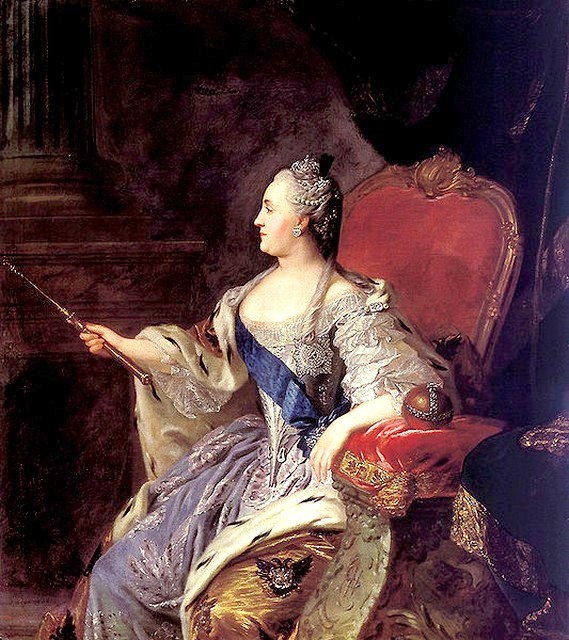
Catherine the Great (1729-1796)
Portrait by Fyodor Rokotov (1736-1808)
PETER THE GREAT—to whom we must always return—had no redeeming features. Save only his chroniclers. He outraged convention and called it reform. A monk seeking the philosopher's stone found gunpowder. Peter, experimenting in high explosives, produced inadvertently a crude system, which is his sole title to greatness.
On the contrary, Catherine II. honestly endeavoured to elevate the soul of Russia. Her morals were despicable, but her tastes were excellent. Sir Joshua Reynolds, Kauffmann, Chardin, Vernet, all painted pictures for her. The world was searched for libraries and treasures of art. She it was who made St. Petersburg a city—previously it had been a freak. Peter built it on the bones of his slaves and populated it by ukase.
Architects, painters, sculptors, doctors, philosophers, and great teachers gathered at her invitation. She built cities and made Russia less uninhabitable. For there was in Catherine the possibilities of greatness; she had a public mind.
You take the list of Catherine's lovers, a bewildering roll of Russified names; you may remember that from her eighteenth year to her sixty-eighth she was never without attention, and put against her record the murders of Peter and Ivan; but the strength of this wonderful character throws her frailties into the background, and reduces her crimes to acts of expediency. Nobody can doubt that the removal of Peter III. was anything but a blessing—the killing of Ivan had no other effect than to effectively arrest the direct descent of the progeny of the Great Peter, and her lovers did little more harm to Russia than impoverish the treasury. For Catherine was truly generous to her favourites. Only occasionally did serfdom suffer by her generosity; but then serfdom was an inconsiderable factor.
Once she took a journey through her kingdom. She had expressed a wish to see for herself the condition of her people. An obliging Minister went in advance, dressed a thousand peasants gaily and prosperously, and these standing about in studied attitudes of ease as Catherine drove through the villages satisfied her. The peasant-players were less satisfied, for their duty it was to make forced marches from village to village in order, when Catherine slept, to get ahead of her, and show themselves all over again at the next village. Many died of exposure and fatigue.
If you would know more of the Russian people of this period, read this extract from a list of punishments handed down by the descendants of Count Rumyantsev. They are punishments inflicted on servants. For entering his master's room while asleep—sentenced to be flogged and to lose his name! To be called only by an insulting nickname, any one infringing this order to receive 5,000 blows of the stick without mercy; 17,000 blows was the maximum, and there was an order that the unfortunate recipient should not remain in bed longer than a week. Countess Soltykov is known to have put to death by means of refined tortures 137 of her serfs—of both sexes. One of these was a girl of fifteen. Under the regime established by Catherine, the Countess was punished—before Catherine she would not even have been brought to justice.
Expediency was the keynote of her character. Everything must give way to that. Catherine did terrible things—one may be described as revolting. But at the bottom of all her acts lay that word "expediency."
She had a son, the Grand Duke Paul. Some time later you will see him prying with suspicious curiosity into the question of his parentage. By an extraordinary process of mind he became convinced that the Peter, Catherine's murdered husband, was really his father, whereupon his unquiet mind roamed for evidence of Catherine's complicity in his father's death. The same process of thought adjudged her innocent. "Thank God," he said, raising pious eyes, and a Te Deum was sung.
This Paul favoured the dead Peter in appearance, which is a euphonious way of saying that he was remarkably unattractive. He favoured Peter, too, in his German sympathies, his paste-board soldiers, his Prussian uniforms, and in his follies generally.
Elizabeth had kept Catherine well under observation, had treated her with suspicion—well-founded, if the truth be told—had restricted her income, and had proscribed her movements. Catherine profited by the lesson, and her son was watched closely. Paul hated his mother, and Catherine returned the compliment. She found him a wife, however, with whom he was moderately satisfied, and with whom he was fairly happy. The chroniclers of the period, who were always prepared to say flattering things of royalty, could not perjure themselves about Paul's wife. They describe her as "very plain."
"I have rarely beheld a young person less favoured by nature," wrote the English Minister.
The story of this plump daughter of the Landgrave of Hesse- Darmstadt—Catherine went to Germany for her future Tsarina— makes pathetic reading. Plain though she was, she attracted the attentions of the handsomest man at the Court, and there was a correspondence. Also she plotted in a perfectly transparent manner to dethrone her mother-in-law. Then a baby was born, but did not survive.
Catherine waiting in the palace, surrounded by her Ministers, received the news with consternation. Immediately there followed a grave physician, who informed her that the Grand Duchess would be unlikely to rear more children. Expediency was the keynote of Catherine's character. She summoned her Council, and made a suggestion—the Grand Duchess should be quietly and immediately killed. Paul, the husband, was against this, but they showed him some of his wife's love-letters—that were not addressed to him. Paul agreed, and the poor plain little woman was quietly and painlessly executed.
"I decided to sacrifice the Grand Duchess in the interest of the Empire." Catherine was an Imperialist with particularly dreadful methods.
Catherine found another wife for her son, a Prussian princess; also, if portraits be true, unprepossessing. To meet this new wife Paul journeyed to Berlin, and was welcomed by the King in a speech so full of pleasant hypocrisies that even hardened historians present it with many apologies. His second wife presented him with nine children, two of whom eventually assisted in murdering him.
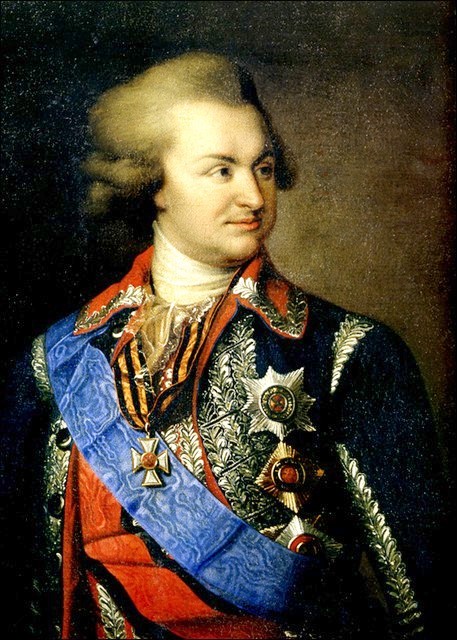
Grigory Potemkin (1739-1791)
Non-contemporary portrait (1884) by an unknown artist
LET us deal faithfully by Catherine and regard her lovers, even as she did, generously. I have already said that their influence on Russia was of a negative character. Biron, the lover of Anne, was, by virtue of the enormous power that he wielded, absolute Tsar. He slew and tortured, and stole and ravaged. He assumed the highest offices of State, and. governed Russia, Tsar by right of love.
Catherine gave her lovers power and office, but between their whims and Russia she stood continuously. They could wreak their will at Court; they could be used for favours; and the suitors might know that such would prove profitable. They became Grand Masters of Artillery, and were hung about with glittering decorations, but never one had continuity of office, and the knowledge of the precarious character of their positions had a sobering and salutary effect.
Historians credit Catherine with a hundred lovers. Perhaps there were less. We know of a dozen or so, who took some £9,400,000 from the Treasury; we have hints of less distinguished favourites; we know the story of the review that Catherine saw from a upper window; and it is probable that in her fifty years of love-making Catherine exceeded the century. Soltikov we know; Naryshkin was his contemporary— the rest are names. Stanislaus Poniatowski—he became a king by favour of Catherine. Gregory Orlov, whose strong hands choked Peter; Alexis, his brother; and, most ambitious of all, Potemkin.
This "Tomkins"—so an English attaché described him—represents Catherine's most glaring lapse. For there was nothing about him that we may regard as fascinating. The Orlovs were splendid men physically, Stanislaus was a gentle creature, but Potemkin was "dreadful and repulsive in appearance." Molloy thus describes him in a recently published work:—
"One of his eyes was gone, the result of a quarrel with Alexis Orlov, his thin body wriggled as he walked, and his knees knocked together. He seldom took the trouble to wash himself or comb his matted black hair—also he wrote poetry."
As for Catherine, she referred to him as "My soul, my life, my inestimable treasure." And yet Potemkin, unlovely a figure as he was, unpicturesque, even uncleanly, more nearly attained to the absolute power over Russia than did any other of Catherine's favourites.
The story of his one error makes delightful reading. It shows Catherine as a humourist. Ambition spurred Potemkin to aspire to the throne of Russia. It was not sufficient for him that he was the first man in the Empire, he must needs covet the crown. There was a State journey to the monastery of Troitsa. Catherine, her son, and her lover were of the party. Arrived at the monastery, a strange thing happened. Discarding his fine robes and uniforms of State, Potemkin took on the habit of a monk, began to fast and pray, lived the hardest of lives, and generally embarrassed Catherine, who thought her lover had gone mad. He rose before daybreak to chant the Psalms. Then came the favourite's confessor to Catherine to make a momentous announcement. Potemkin was repenting of his many sins, he had been made alerted to the enormity of his sinful relations with the Empress, and could never again resume them unless they were made lawful by the blessing of the Church.
Here Catherine's fine sense of humour asserted itself. She could not give an immediate answer, she replied gravely; but she would make her feelings known to the repentant Minister himself. Potemkin received the message gleefully. He regarded his cause as won. He came and met his mistress face to face. The comedy was delicious. Catherine rose with downcast eye and sorrowful mien. She listened to him as he spoke of Grace and Repentance, and the voice that urged him to seek the peacefulness of the cloister.
Then Catherine spoke, always tenderly, always in sorrow, but firm withal:—
"Since you have bidden adieu to the old life, since grace has come to you so unexpectedly, I will not stand between yourself and salvation. Remain here in peace, and seek the salvation of your soul. As for me, I part from you with sorrow—but it is God's will." As Catherine left the presence of the astounded hypocrite she probably smiled—the pity is that no record of that smile was taken.
In fullness of time Catherine passed to her fathers. One wonders in what manner her staid, sober forbears welcomed their child to the spirit world. She was sixty-eight when she died, and madly in love with a man forty years her junior.
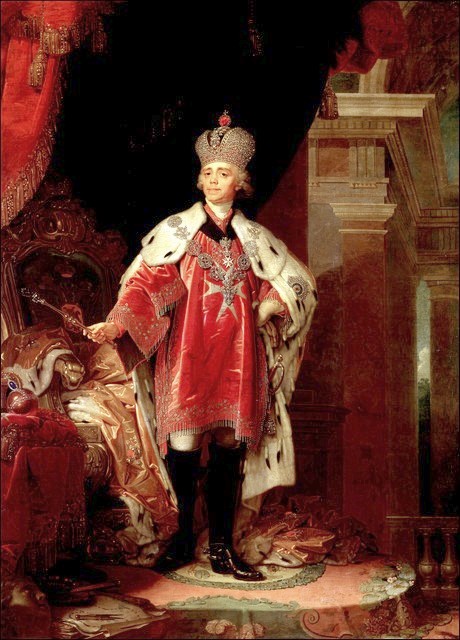
Tsar Paul I (1754-1801)
Portrait by
Vladimir Borovikovsky (1757-1825)
THEN followed Paul, and Paul, who was Peter-and- water, did all the things that Russia mostly hated. He it was who framed absurd regulations for the conduct of every-day life, who laid down the pattern of hat a man might wear, the cut of his coat, the colour of his sleigh. Russia stood still when Paul passed by—stood still with its hat off and its head bowed humbly. Young or old, rich or poor, you stopped your carriage at the sight of Paul's equipage, descended into the muddy road, and waited breathlessly until he passed. Sometimes Paul was dissatisfied with the shape of your sleigh, and he would have it destroyed on the spot. Sometimes you wore a hat proscribed by regulation—then you were knouted.
It was left to an Englishman—surely it was an Irishman—to embarrass Paul. This Briton appeared one day in the streets of St. Petersburg wearing a curious form of headgear. The police saw it, and were puzzled. They searched the list of hats permitted and hats forbidden. It was in neither. They consulted the Tsar—the Tsar called his sartorial experts together. There was no name they could give this strange covering. So an ukase was launched forbidding the people of Russia to wear "a hat similar to that worn by a certain Englishman." It was a huntsman's peaked cap.
There have been Russian monarchs more cruel than Paul, more bloodthirsty, greater criminals, but their salvation was the enormity of their crimes. They scourged and slew with ferocious remorselessness, and a trembling people hated, feared, and respected them. Paul irritated Russia, and accordingly died. Here is Karamzin's account of the death.
March 23rd, 1801, was selected for the deed. The Semenovsky Regiment, the officers of which had been won over to the plot, guarded the Winter Palace. At about midnight the conspirators proceeded to Paul's bedroom. Count Pahlen stood outside the door, ready to see that they finished the deed, or to hand them over to Paul's mercy if they failed. One of them carried a lamp. The Tsar was not in bed, but they felt and found it still warm. They looked around and found him crouching in a corner of the room, doubtless hoping to escape in the darkness. Apparently he had expected trouble, for he was partly clothed and wearing a dressing-gown. General Bennigsen, with a sword in his right hand, presented an act of abdication in his left, which he ordered Paul to sign.
"You traitor!" shrieked Paul, and began to cry for help. The lamp fell to the floor and left the room in darkness. The conspirators leaped upon Paul and bore him to the ground, fighting like a demon. Then they passed an officer's sash round his neck. Nikolai Zubov and Prince Yashvil pulled it taut and strangled him to death.
Roy Glashan's Library
Non sibi sed omnibus
Go to Home Page
This work is out of copyright in countries with a copyright
period of 70 years or less, after the year of the author's death.
If it is under copyright in your country of residence,
do not download or redistribute this file.
Original content added by RGL (e.g., introductions, notes,
RGL covers) is proprietary and protected by copyright.